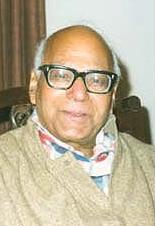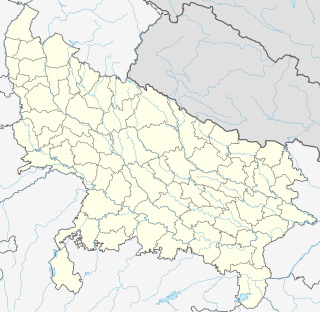
Arun Shourie is an Indian economist, journalist, author and politician. He has worked as an economist with the World Bank, a consultant to the Planning Commission of India, editor of the Indian Express and The Times of India and a Minister of Communications and Information Technology in the Vajpayee Ministry (1998–2004). He was awarded the Ramon Magsaysay Award in 1982 and the Padma Bhushan in 1990.

Ram Swarup, born Ram Swarup Agarwal, was an Indian author and one of the most important thought leaders of the Hindu revivalist movement. His works took a critical stance against Christianity, Islam and Communism.

Sita Ram Goel was an Indian religious and political activist, writer, historian and publisher in the late twentieth century. He had Marxist leanings during the 1940s, but later became an outspoken anti-communist and also wrote extensively on the damage to Indian culture and heritage wrought by expansionist Islam and missionary activities of Christianity. In his later career he emerged as a commentator on Indian politics, and adhered to Hindu nationalism.
In the Indian context, the term pseudo-secularism is used to pejoratively describe policies considered to involve minority appeasement. The Hindus form the majority religious community in India; the term "pseudo-secular" implies that those who claim to be secular are actually not so, but are anti-Hindu or pro-minority. The Hindu nationalist politicians accused of being "communal" use it as a counter-accusation against their critics.

Ram Janmabhoomi is the name given to the site that is believed to be the birthplace of Rama, the seventh avatar of the Hindu deity Vishnu. The Ramayana states that the location of Rama's birthplace is on the banks of the Sarayu river in a city called "Ayodhya".
In the field of comparative religion, many scholars, academics, religious figures have looked at the relationships between Hinduism and other religions.
Hindu Temples – What Happened to Them is a two-volume book by Sita Ram Goel, Arun Shourie, Harsh Narain, Jay Dubashi and Ram Swarup. The first volume was published in the Spring of 1990.

The Calcutta Quran Petition is a book by Sita Ram Goel and Chandmal Chopra published by Goel under his Voice of India imprint. The first edition was published in 1986, the second in 1987 and the third in 1999.

Hinduism is the largest religion in India, with 79.8% of the population identifying themselves as Hindus, that accounts for 966 million Hindus as of National Census of India in 2011 making it as the world's largest Hindu populated country with around 94% global Hindu population are being concentrated here. While 14.2% of the population follow Islam and the remaining 6% adhere to other religions. The vast majority of Hindus in India belong to Shaivite and Vaishnavite denominations. India is one of the three countries in the world where Hinduism is the majority.
How I Became a Hindu is an autobiography by Sita Ram Goel, which he published in 1982 and enlarged in 1993 under his Voice of India imprint.
In general, censorship in India, which involves the suppression of speech or other public communication, raises issues of freedom of speech, which is protected by the Indian constitution.
Raghupati Raghav Raja Ram is a notable bhajan widely popularised by Mahatma Gandhi. The most popular version of this bhajan was set to tune by Hindustani classical musician, Pandit Vishnu Digambar Paluskar.
Voice of India (VOI) is a publishing house based in New Delhi, India, that specialises in Hindu nationalist books and serves as one of the most important tools in the development of Hindutva ideologies. It was established by Sita Ram Goel in 1981, to develop a Hindu triumphalist ideology, and has since published numerous authors subscribing to similar thought-schools.

The Satanic Verses controversy, also known as the Rushdie Affair, was the heated reaction of Muslims to the publication of Salman Rushdie's novel The Satanic Verses, which was first published in the United Kingdom in 1988 and inspired in part by the life of Muhammad. Many Muslims accused Rushdie of blasphemy or unbelief and in 1989 the Ayatollah Ruhollah Khomeini of Iran issued a fatwa ordering Muslims to kill Rushdie. Numerous killings, attempted killings, and bombings resulted in response to the novel.

Aafat is 1977 Bollywood film directed by Atma Ram, starring Navin Nischol, Leena Chandavarkar, Amjad Khan, Mehmood and Nazir Hussain.

Yeh Rishta Kya Kehlata Hai is an Indian television soap opera that airs on Star Plus and streams on Hotstar. It premiered on January 12, 2009 and is the fourth longest running Indian television soap opera. Produced by Rajan Shahi under Director's Kut Productions, it initially starred Hina Khan and Karan Mehra and currently stars Shivangi Joshi and Mohsin Khan.
The hate speech laws in India aim to prevent discord among its many ethnic and religious communities. The laws allow a citizen to seek the punishment of anyone who shows the citizen disrespect "on grounds of religion, race, place of birth, residence, language, caste, sexual orientation, gender identity or any other ground whatsoever". The laws specifically forbid anyone from outraging someone's "religious feelings".
This is a bibliography of literature treating the topic of criticism of Islam, sorted by source publication and the author's last name.

Islamic teachings and argument have been used to censor opinions and writings throughout history, up to and including the modern era, and thus there are many cases of censorship in Islamic societies. One example is the fatwa against The Satanic Verses, ordering that the author be executed for blasphemy. Depictions of Muhammad have inspired considerable controversy and censorship. Some Islamic societies have religious police, who enforce the application of Islamic Sharia law.
This is a bibliography of literature treating the topic of criticism of Christianity, sorted by source publication and the author's last name.








